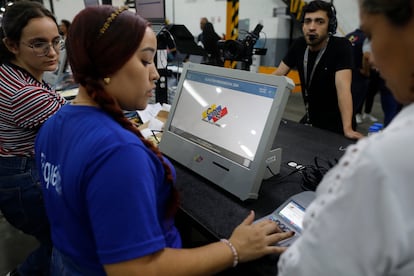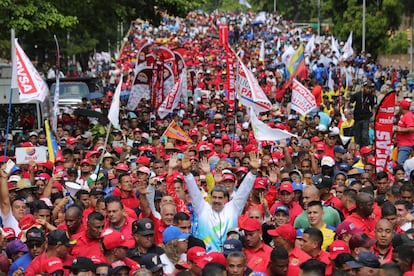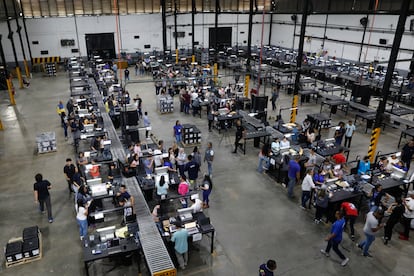Difficult to manipulate, yet fraught with electoral trickery: How Venezuela’s voting system functions
Experts say that polling machines and their printed records are reliable, at least in theory, but warn that Chavismo may discourage participation and threaten voters with revoking their government benefits

At the start of the 2000s, when Chavismo was in its early days of power, its leaders feared that their opposition was plotting fraudulent maneuvers during the elections. At that point, in agreement with other political factions, they implemented an automated voting system to prevent cheating. Now, two decades later, and with the Chavista government in control of the National Electoral Council (CNE), this same system has emerged as a source of hope for the opposition, which believes it has enough support to win the presidency. Several experts agree that automated voting does work, at least on paper. The movement behind the united candidacy of Edmundo González Urrutia and María Corina Machado hopes as much for July 28, the day that could mark an end to 25 years of Chavista governments.
At first glance, such confidence appears excessive. In addition to its control over the CNE, Chavismo has undertaken all kinds of measures to discourage electoral participation and has threatened to revoke government benefits if citizens don’t vote for its candidates. However, experts consulted by EL PAÍS say that the country’s technological voting system may be a great ally in avoiding fraud. Each machine prints out certificates before sending its results to the CNE. This paper trail may be the key to determining the real winner of the elections in which Urrutia is facing off against President Nicolás Maduro.
An uphill road
Opposition forces have already cleared several significant hurdles on the road to election day. Polls show that support for Machado, who won the opposition’s primaries in October but was disqualified from running in January, has been successfully transferred to Urrutia, a diplomat who was nearly unknown until a few months ago. Now, the challenge lies in generating massive voter turnout on Sunday in a country where voting is optional. Manuel Camilo González, an expert in electoral systems and professor of international relations at Bogotá's Javeriana University, explains by telephone that a low turnout at the polls usually benefits incumbent regimes and their moneyed electoral machines. “The lower the turnout, the higher percentage of people at the polls who are hardcore supporters, who are mobilized via coercion and clientelism,” says the expert.
It is true that the current government has already managed to limit migrant turnout to the polls. According to data collected by the EFE news agency, only 69,000 people have been cleared to vote abroad. That’s a tiny number, given that the Venezuelan diaspora is currently composed of 7.5 million people, of whom five million are of voting age. For example, more than four million people have been displaced to Colombia and Peru in recent years, but the countries are home to only 7,000 and 600 registered Venezuelan voters, respectively. The opposition has denounced the short time period that was allotted for voter registration, saying that it was poorly publicized and marked by legal barriers meant to make the process more difficult to navigate. Chavismo is well aware that those who have left the country are critical of its administration.
Eugenio Martínez, a Venezuelan journalist who specializes in electoral fraud and who is the director of the Votoscopio platform, says via video call that there are also some negative indicators when it comes to the actualization of electoral rolls within the country, where citizens must register to vote and make sure that their data is up to date. “Most of the updates that were made took place in voting centers that have historically voted in favor of the [Chavista] government,” says the journalist. In addition, there are 1,700 new, single-table polling centers. The expert finds this worrisome because it is these small polling sites that usually generate the highest numbers of complaints when it comes to the buying of votes and irregular extensions of voting hours.

Sophisticated machines
One point in favor of the opposition lies in the voting platforms, which throughout the years have been updated with all kinds of anti-fraud devices. These include biometric voter identification and, according to Martínez, the system prevents the CNE from knowing how individual people vote by separating citizens’ data from their vote. In addition, after voting, the machines print out a paper record, which the voter then verifies and deposits in a ballot box, which undergo a subsequent, partial manual review. At the end of the day, the machine prints a record of results — in front of electoral witnesses — and then sends the data by telephone or satellite to the counting center. Martínez points out that there is no risk of electrical failure affecting this process because the machines run on batteries in order to ensure their autonomy from the grid.
Experts consulted agree that the issue does not lie in the voting platforms, which have become allies for the opposition. “Although it is often said on social media that the machines change the votes, or that they can commit voter identity fraud, audits have shown that this does not happen and that it would be easy to denounce in the case that it did,” says Martínez. Griselda Colina, former alternate rector of the CNE and current director of the Global Observatory of Communication and Democracy, says something similar: “The regime wanted to make a strong electoral system so that nobody could cheat them. It is so robust that it has allowed various factions to win elections. If it could alter votes, why did Chavismo lose in the 2015 legislative elections?”
Both experts clarify the machines’ trustworthiness doesn’t negate the fact that the CNE has been co-opted by Chavismo and could announce fraudulent results. Nonetheless, they trust in the efficiency of their system’s verification mechanisms and emphasize that it is important that citizens know they can bear witness to these processes. “When the presiding officer closes the polls, a tally sheet with a QR code is printed. People [in addition to witnesses] can enter and record that code to ensure greater control over the results,” Colina explains in video call. These records, says the expert, must then be checked against the announcement of the electoral authorities. “We have to demand that the CNE break down the results of each polling station and each table in order for them to be verified,” he adds.

Uncertainties
There are various additional obstacles that could manifest themselves during the electoral period and that play a role in generating uncertainty. Experts cite irregular extensions of voting hours in Chavista areas, violent episodes in districts that are supportive of the opposition, and the operation of checkpoints run by the government’s Socialist Party of Venezuela (PSUV), in the vicinity of polling centers. Likewise, González says that the government could disregard adverse results and judicialize the process, as it did with the Barinas elections in 2021 — which were repeated in 2022, with a repeat opposition victory. The CNE, for its part, could announce a Chavista victory without breaking down the results by polling centers, thereby making verification difficult, as it did in the National Constituent Assembly elections in 2017 and in the Essequibo annexation referendum, which did not feature credible participation numbers.
Experts differ on their level of optimism heading into the election. González points out certain precedents that suggest the government could create violent situations to sow doubt about voting legitimacy. Martínez, for his part, agrees with the likelihood of this kind of scenario, but emphasizes that the voting machines’ trustworthiness reduces the risks of fraud at the level necessary for Chavismo to obscure the election’s results. “Manipulation through institutional control only works when the difference between the two candidates is not very wide [opinion polls are pointing to a nearly 25-point gap],” he says. Colina is the most optimistic of the bunch. “Chavismo is thinking about its future and next year’s [legislative and regional] elections,” she says. “They’re going to see how they can carry on and not lose everything.”
Sign up for our weekly newsletter to get more English-language news coverage from EL PAÍS USA Edition
Tu suscripción se está usando en otro dispositivo
¿Quieres añadir otro usuario a tu suscripción?
Si continúas leyendo en este dispositivo, no se podrá leer en el otro.
FlechaTu suscripción se está usando en otro dispositivo y solo puedes acceder a EL PAÍS desde un dispositivo a la vez.
Si quieres compartir tu cuenta, cambia tu suscripción a la modalidad Premium, así podrás añadir otro usuario. Cada uno accederá con su propia cuenta de email, lo que os permitirá personalizar vuestra experiencia en EL PAÍS.
¿Tienes una suscripción de empresa? Accede aquí para contratar más cuentas.
En el caso de no saber quién está usando tu cuenta, te recomendamos cambiar tu contraseña aquí.
Si decides continuar compartiendo tu cuenta, este mensaje se mostrará en tu dispositivo y en el de la otra persona que está usando tu cuenta de forma indefinida, afectando a tu experiencia de lectura. Puedes consultar aquí los términos y condiciones de la suscripción digital.









































